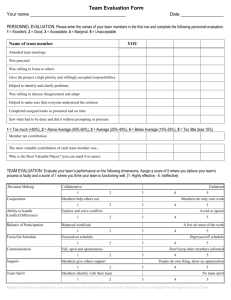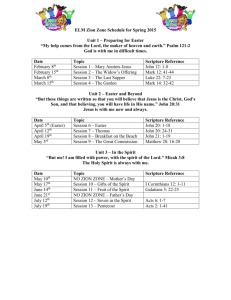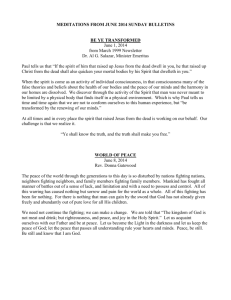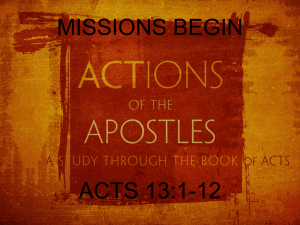2014-11-02 DONT BELIEVE EVERYTHING YOU HEAR
advertisement
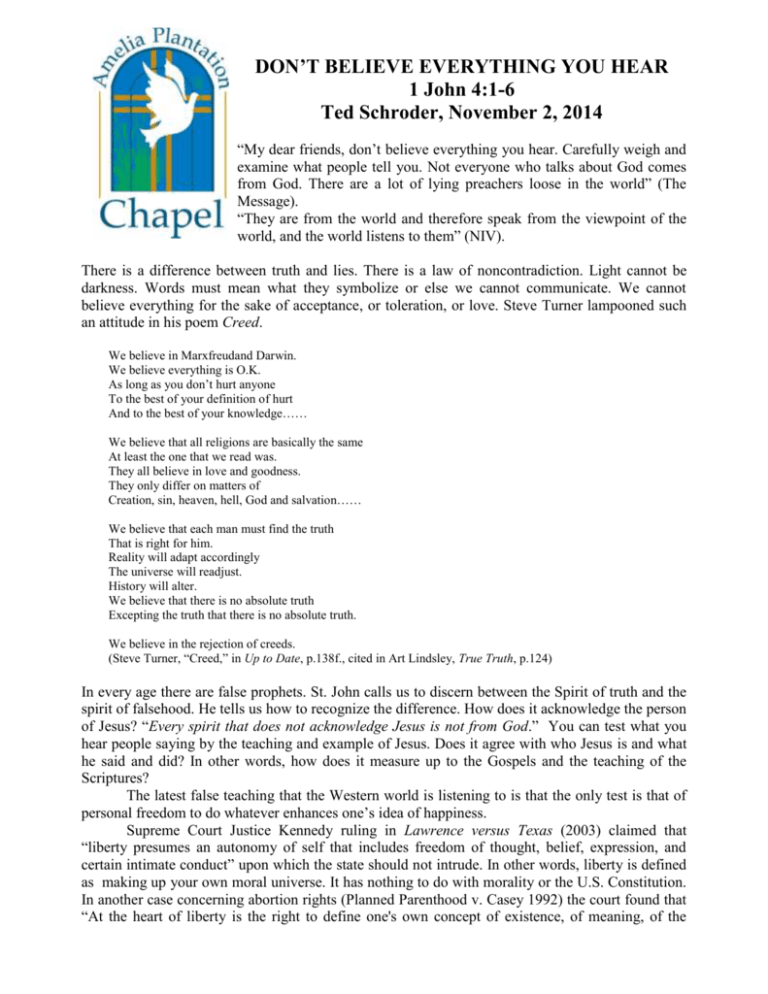
DON’T BELIEVE EVERYTHING YOU HEAR 1 John 4:1-6 Ted Schroder, November 2, 2014 “My dear friends, don’t believe everything you hear. Carefully weigh and examine what people tell you. Not everyone who talks about God comes from God. There are a lot of lying preachers loose in the world” (The Message). “They are from the world and therefore speak from the viewpoint of the world, and the world listens to them” (NIV). There is a difference between truth and lies. There is a law of noncontradiction. Light cannot be darkness. Words must mean what they symbolize or else we cannot communicate. We cannot believe everything for the sake of acceptance, or toleration, or love. Steve Turner lampooned such an attitude in his poem Creed. We believe in Marxfreudand Darwin. We believe everything is O.K. As long as you don’t hurt anyone To the best of your definition of hurt And to the best of your knowledge…… We believe that all religions are basically the same At least the one that we read was. They all believe in love and goodness. They only differ on matters of Creation, sin, heaven, hell, God and salvation…… We believe that each man must find the truth That is right for him. Reality will adapt accordingly The universe will readjust. History will alter. We believe that there is no absolute truth Excepting the truth that there is no absolute truth. We believe in the rejection of creeds. (Steve Turner, “Creed,” in Up to Date, p.138f., cited in Art Lindsley, True Truth, p.124) In every age there are false prophets. St. John calls us to discern between the Spirit of truth and the spirit of falsehood. He tells us how to recognize the difference. How does it acknowledge the person of Jesus? “Every spirit that does not acknowledge Jesus is not from God.” You can test what you hear people saying by the teaching and example of Jesus. Does it agree with who Jesus is and what he said and did? In other words, how does it measure up to the Gospels and the teaching of the Scriptures? The latest false teaching that the Western world is listening to is that the only test is that of personal freedom to do whatever enhances one’s idea of happiness. Supreme Court Justice Kennedy ruling in Lawrence versus Texas (2003) claimed that “liberty presumes an autonomy of self that includes freedom of thought, belief, expression, and certain intimate conduct” upon which the state should not intrude. In other words, liberty is defined as making up your own moral universe. It has nothing to do with morality or the U.S. Constitution. In another case concerning abortion rights (Planned Parenthood v. Casey 1992) the court found that “At the heart of liberty is the right to define one's own concept of existence, of meaning, of the universe, and of the mystery of human life.” As Robert Reilly comments, “Liberty does not mean freedom to choose what is right; it means becoming the source of what is right. It means not conforming oneself to what is good, but making up one's own good.” (Robert R. Reilly, Making Gay Okay, p.81) This is called Relativism or Anything Goes. Like all lies, if you tell them often enough, people will come to believe that they must be true. The Soviet Union was expert at it. After the show trials of its early leaders an enquirer asked, “But are their confessions true?” An English reporter quipped, “In Russia, everything is true except the facts.” Today, what is taught as true, e.g. civil law has nothing to do with morality, flies in the face of the facts of our Christian history and civilization. Its conclusion is that children should be taught that everything is permitted and that they should experiment with every kind of sexual behavior as they see it on television or on the internet. Yale University historian and professor emeritus Donald Kagan has written, “our schools have retreated from the idea of moral education, except for some attempts at what is called ‘values clarification,’ which is generally a cloak for moral relativism verging on nihilism of the sort that asserts that whatever feels good is good.” (WSJ, Sept.27-28, 2014) C.S. Lewis wrote, “Moral relativity is the enemy we have to overcome before we tackle atheism.” How does moral relativity measure up to what Jesus said or did? In the Sermon on the Mount he applied the Ten Commandments to our motivations and attitudes as well as our actions. He made it clear that the commandments were the measure of what was good and to be conformed to. We don’t make up our own good. It is the essence of hubris to think that we can make up our own moral universe. We are not to be intimidated by the spirit of Relativism in our culture, even when it comes from the Supreme Court of the land. We are called in our day to overcome the false teaching we encounter through our witness to the truth as it is in Jesus. “My dear children, you come from God and belong to God. You have already won a big victory over those false teachers, for the Spirit in you is far stronger than anything in the world. These people belong to the Christ-denying world. They talk the world’s language and the world eats it up. But we come from God and belong to God. Anyone who knows God, understand us and listens. The person who has nothing to do with God will, of course, not listen to us. This is another test for telling the Spirit of Truth from the spirit of deception” (The Message). James Russell Lowell (1819-1891) the abolitionist wrote The Present Crisis in 1845 to protest the Mexican War. Four verses of the poem have become famous as a hymn encouraging witnessing to the Spirit of truth. Once to every man and nation, comes the moment to decide, In the strife of truth with falsehood, for the good or evil side; Some great cause, some great decision, offering each the bloom or blight, And the choice goes by forever, ’twixt that darkness and that light. Then to side with truth is noble, when we share her wretched crust, Ere her cause bring fame and profit, and ’tis prosperous to be just; Then it is the brave man chooses while the coward stands aside, Till the multitude make virtue of the faith they had denied. By the light of burning martyrs, Christ, Thy bleeding feet we track, Toiling up new Calv’ries ever with the cross that turns not back; New occasions teach new duties, time makes ancient good uncouth, They must upward still and onward, who would keep abreast of truth. Though the cause of evil prosper, yet the truth alone is strong; Though her portion be the scaffold, and upon the throne be wrong; Yet that scaffold sways the future, and behind the dim unknown, Standeth God within the shadow, keeping watch above His own.



